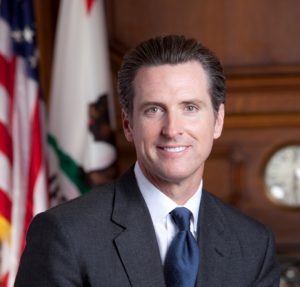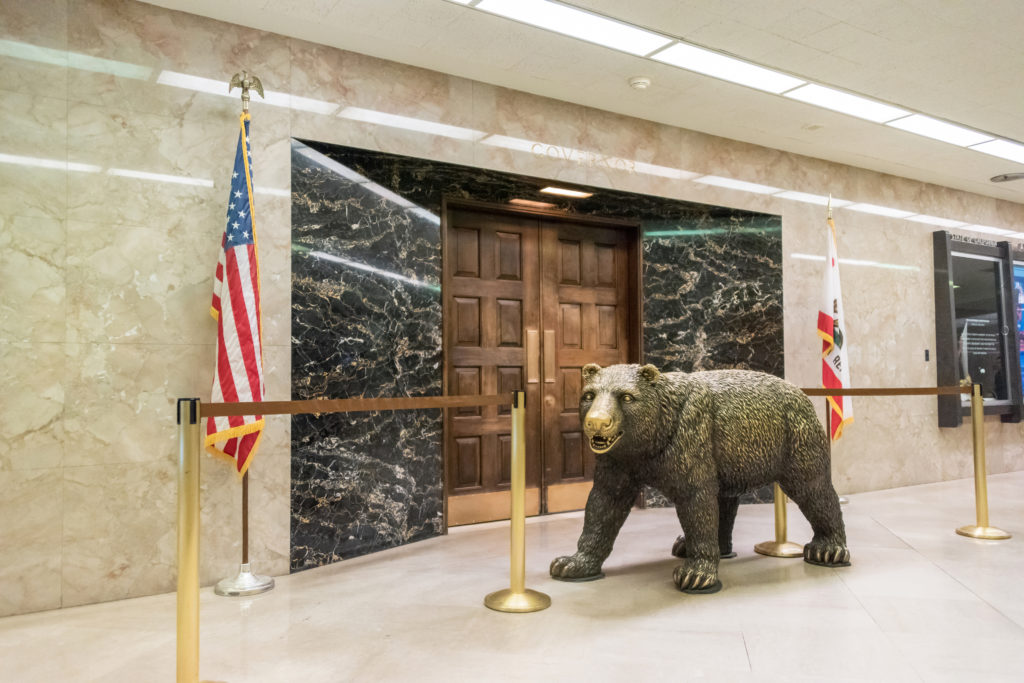
Calif. Gov. Newsom: Rebuttable presumption that worker with COVID-19 got it on the job
By onAnnouncements | Associations | Business Practices | Education | Insurance | Legal | Repair Operations
Democratic California Gov. Gavin Newsom on Wednesday issued an executive order that employees filing workers compensation claims for COVID-19 as of March 19 were presumed to have contracted the disease at their workplace.
The move could affect collision repairers and other essential businesses permitted to remain open following Newsom’s March 19 “stay at home” order.
“The Governor’s Executive Order will increase insurance costs for CA auto body shop employers at a time when businesses are already facing significant financial challenges,” California Autobody Association lobbyist Jack Molodanof (Molodanof Government Relations) wrote in an email Thursday.
Newsom’s new order follows a lawsuit, temporary restraining order and ultimate repeal of a similar worker’s comp action in Illinois. It’s possible other states’ officials might be considering such actions as well, which could raise insurance premium issues for shops in those areas.
However, a body shop estimator on Thursday also offered us a counterpoint from an employee’s perspective.
“The other side of the equation however is the reality that not all body shops are following recommendations from the CDC, or OSHA, or ASA, or even following their governor’s orders,” the estimator wrote in an email Thursday. “I work in such a shop, so I know first hand the increased risk of continuing to do ‘business as usual’ amidst a pandemic. Its stupid, its risky, but its for real. Therefore I agree with the intent of the workers comp modification to protect workers from their employers.”
California order
Newsom’s order states “Any COVID-19-related illness of an employee shall be presumed to arise out of and in the course of the employment for purposes of awarding workers’ compensation” if the employee tested positive for COVID-19 or had been correctly diagnosed with it within 14 days of being on the job. (Working from home doesn’t count, though.)
The presumption only will exist for COVID-19 cases tied to work the 60 days after the order. It also can be refuted.
“The presumption set forth in Paragraph 1 is disputable and may be controverted by other evidence, but unless so controverted, the Workers’ Compensation Appeals Board is bound to find in accordance with it,” Newsom wrote. “This presumption shall only apply to dates of injury occurring through 60 days following the date of this Order.”
“We are removing a burden for workers on the front lines, who risk their own health and safety to deliver critical services to our fellow Californians, so that they can access benefits, and be able to focus on their recovery,” Newsom said in a statement. “Workers’ compensation is a critical piece to reopening the state and it will help workers get the care they need to get healthy, and in turn, protect public health.”
Compromise option?
The Society of Collision Repair Specialists and other associations representing essential auto maintenance, service and repair businesses on April 28 urged the National Governors Association, Council of State Governments, National Association of Insurance Commissioners and National Conference of State Legislatures to treat businesses fairly during efforts to “streamline” workers comp.
The trade groups asked the officials to “make clear that any factors used for streamlining, such as an employee testing positive for COVID-19, must include recognition of the fact that there is currently no way to determine exactly when or where anyone has contracted COVID-19.”
They also asked to exclude COVID-19 from employer experience rates, which compare the number of claims at one business to others in the same industry.
The Workers’ Compensation Insurance Rating Bureau of California last month suggested cutting employers a break as well. It said April 20 it proposed to the California Department of Insurance:
Claims arising directly from a diagnosis of COVID-19 with an accident date on or after December 1, 2019, would be excluded from the experience rating calculations of individual employers. Since the occurrence or non-occurrence of COVID-19 workers’ compensation claims incurred by an employer is unlikely to be a strong predictor of that employer’s future workers’ compensation claim costs, the inclusion of such claims in an experience modification calculation would not meet the intended goal of experience rating. …
Payments made to employees who are continuing to be paid while not engaged in any work activities would be excluded from reportable payroll. This exclusion would apply while California’s statewide stay-at-home order is in place and for up to 30 days thereafter if the employee continues not to work. Excluding this payroll recognizes the extraordinary circumstances resulting from the stay-at-home order and the fact that employees not engaged in work activities have virtually no work-related exposure.
The CDI will hold a hearing on the idea May 18. Learn more here about attending or submitting public comment.
Newsom’s order makes employees’ claims “eligible for all benefits applicable under the workers’ compensation laws of this state, including full hospital, surgical, medical treatment, disability indemnity, and death benefits, and shall be subject to those laws.” However, sick leave benefits must be exhausted before temporary disability or certain other benefits are paid out, and the Department of Industrial Relations won’t collect on any Labor Code 4706.5 death benefit payments.
We asked the Illinois Manufacturer’s Association, which successfully fought the Illinois Workers Compensation Commission’s essential business COVID-19 order, about the idea of an experience modification exemption. CEO Mark Denzler said one had to “play that string out.” If insurers are paying out more in workers’ comp claims, they’ll still have to increase rates.
“There’s gonna be a cost that’s borne,” he said. “… The money doesn’t grow on a tree.”
Denzler said current Illinois law would suffice and could evaluate what would be a “different set of facts” for every situation. He contrasted a nurse whose work circumstances were likely to have resulted in her COVID-19 and another nurse who worked in telehealth. He also offered the example of a truck driver who rarely interacted with anyone.
Employees could have risky workplaces
Our estimator, however, noted that employers might not be taking the risk of COVID-19 seriously enough.
“(E)verything I’ve seen for workplace safety and essential workers seems to be published as if every employer believes COVID-19 is a real threat and they’ll instinctively follow suggestions and recommendations,” the estimator wrote.
“Unfortunately that’s not the case, and honestly workers are lucky if their employers even know what’s in those governor executive orders, let alone follow some limp noodle recommendations from CDC, OSHA, or industry organizations. EVERYTHING my employer knows about and ignores has come from me, even down to the required workers rights publication that our state … requires to be posted in plain sight along with the dept of labor posters.
“I have a feeling it is very much business as usual at most places. … I cycle for exercise and ride through industrial areas and I rarely ever see any workers practicing social distancing or wearing masks.
“I don’t think employers in Illinois even have PPE, (including our body shop). Honestly stores still don’t have hand sanitizer or disinfectant wipes!”
The estimator noted that his job offered less risk than professions like a grocery store employee or rideshare driver but still carried risk.
OSHA’s COVID-19 risk pyramid defines moderate risk employees to include “Those who may have contact with the general public (e.g., in schools, high population density work environments, and some high-volume retail settings).” Low-risk examples include those working from home and long-haul truck drivers, according to OSHA.
“However, the shop I’m at doesn’t believe the risk is real, or the thought of doing business in some way other than usual, is too much hassle,” the estimator wrote. “Therefore if I were to contract the virus, it would most likely be from spending 10+ hours per day in a risky environment, and I’m glad that provision exists, even if its only reactive and can’t protect me at work, it can at least compensate me if I fell ill and couldn’t work. …
“Fixing scratches and dents while calling it a life sustaining activity is bad enough, but being in a work environment that’s unchanged leaving workers health at risk is ludicrous.”
Tax rules eased on businesses
Newsom did throw California body shops and other business owners a bone with another executive order announced Wednesday.
Measure N-61-20 waives penalties through May 6, 2021, for businesses paying property taxes after the April 10 deadline.
According to the order, the business must file a claim for help and show “to the satisfaction of the tax collector that the taxpayer has suffered economic hardship, or was otherwise unable to tender payment of taxes in a timely fashion, due to the COVID-19 pandemic, or any local, state, or federal government response to COVID-19.”
You still have to pay your taxes, but you could catch a break on “any penalty, costs, or interest resulting from the failure to pay taxes before the date and time such taxes became delinquent,” according to the order.
The governor’s office also moved the deadline for some companies to file business personal property statements without penalties. Eligible companies have until May 31.
“The COVID-19 pandemic has impacted the lives and livelihoods of many, and as we look toward opening our local communities and economies, we want to make sure that those that have been most impacted have the ability to get back on their feet,” Newsom said in a statement.
More information:
Gov. Gavin Newsom’s office, May 6, 2020
California Executive Order N-62-20 on workers’ comp
Gov. Gavin Newsom’s office, May 6, 2020
California Executive Order N-61-20 on taxes
Gov. Gavin Newsom’s office, May 6, 2020
“WCIRB Submits Special Regulatory Filing in Response to COVID-19”
Workers’ Compensation Insurance Rating Bureau of California, April 20, 2020
“Ask the Experts – How Professional Restorers Deal with “Disinfecting” Vehicles”
Society of Collision Repair Specialists, April 28, 2020
Centers for Disease Control, April 29, 2020
CDC interim COVID-19 guidance for businesses
CDC guidance for businesses with suspected/confirmed COVID-19 cases
Centers for Disease Control COVID-19 coronavirus portal
Images:
Democratic California Gov. Gavin Newsom. (Provided by Lieutenant Governor’s Office)
A bear statue stands outside the California Governor’s Office. (Juanmonino/iStock)
Should essential workers have a presumption that they contracted COVID-19 on the job? (z_we/iStock)


